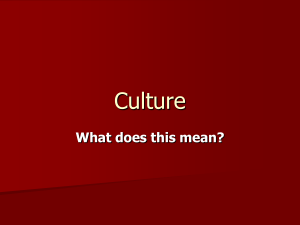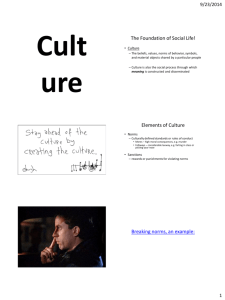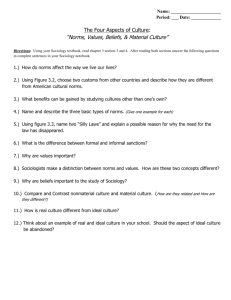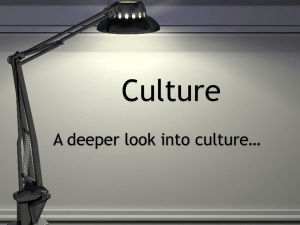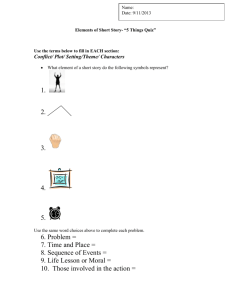Components of Culture - Rowan County Schools
advertisement
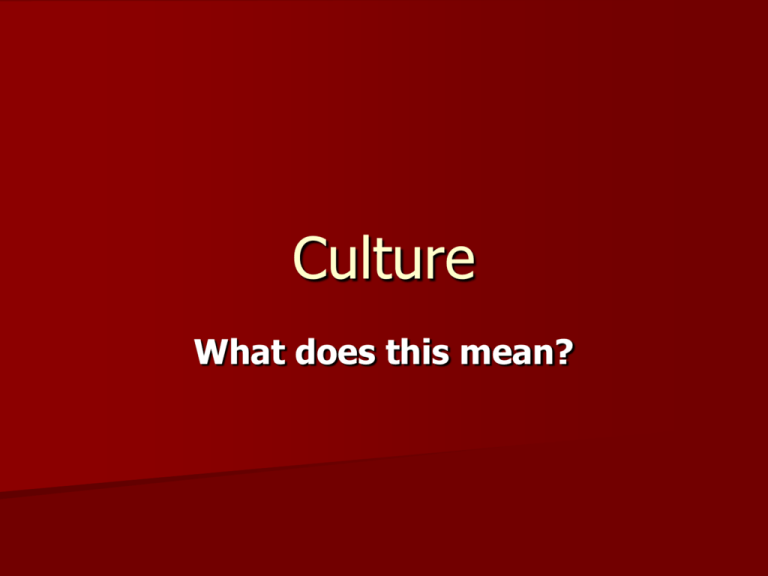
Culture What does this mean? Culture – all the shared products of human groups. This includes both physical objects and the beliefs, values, and behaviors shared by a group. Sociology – You need a ½ sheet of paper – In 500 years, if an archeologist arrived at this room, what would s/he say about the way we lived? Explain, with examples and detail. Material culture – physical or tangible creations that members of society make, use, share Nonmaterial culture – abstract or intangible human creations of society that influence people’s behavior Components of Culture Technology Symbols Language Values Norms Technology The items themselves are important, but the rules of acceptable behavior when using material culture is a part of this. Technology and its impact on cultural change Cultural lag – gap between the technical development (material culture) of a society and its moral and legal institutions (nonmaterial culture) Discovery – learning about something previously unknown Invention – combining existing cultural items into a new form Diffusion the transmission of cultural items or social practices from one group or society to another Symbols It is through symbols that we create our culture and communicate it. Symbols have a shared, accepted meaning. It’s how we make sense of our lives. Culture shock! Inability to read the symbols Sociology questions (1/2 sheet) Would a mosque near the 9/11 site be viewed by most American’s as a symbol of tolerance or a symbol of weakness? Explain. Should this issue even matter to anyone who lives outside that area? Explain. Language The organization of written or spoken symbols into a standardized system. Changing nature of word acceptance – what are some examples Language shapes the view of reality of the speaker –Language and gender The use of the male and female –Language and race, ethnicity Transmission of preconceived ideas Another Question Does the fact that the U.S. does not have an official language damage our culture? Why or why not? Values Language and symbols allow us to communicate our values to one another. Values are shared beliefs about what is good or bad, right or wrong, desirable or undesirable. Question 4 What are core American values? Identify 7. Equal Opportunity The chance to achieve success – Youth sports, clubs organizations – Adult intramural activities – Public school – Federal aide programs Achievement and Success Built into our competitive activities – Grades in school for scholarships and class rank (bumper stickers, choice of school) – Promotions at work for power, prestige, and pay (floor, office) Material Comfort Material possessions = achievement and success Knowledge for self actualization . . . BLAH. Give me $ Material wealth confirms hard work and perseverance Tremendous symbolism here Activity and Work Employment, participation, outdoor activities, cell phones The unemployed are ridiculed Connected to the character issue From the young to the old – Youth sports; “go play outside”; get a summer job – Retirement becomes travel; part-time job, we don’t slow down Practicality and efficiency People want bigger, better, faster For tech - “How well does it work?” “What is its usefulness?” For people - “Is this a realistic thing to do?” “Play it safe” “Play the odds” – We value people on their ability to “get things done.” – Think about a college major Doers vs. dreamers This is why it can be difficult to change institutions like school Progress Often times this is connected with Material Comfort, and later with Science, but it may stand alone. We have always changed government, technology, social structure, for the better, albeit most of the time slowly. “Things can and will get better.” Science/Math/Technology Vary much tied to our comparison with the rest of the world and our progress It controls our health and safety, our reliance on day to day functioning “I want to no numbers, results, proof” Democracy and free enterprise Individual nature of both the political and economic Self-reliance is promoted just as much as equal opportunity Freedom Natural, civil, political, economic, social rights No matter the political attitude the concept of freedom and liberty is always articulated This is oftentimes the first complaint, “I’m being denied my . . .” Racial and/or group superiority American past and present discrimination Do we need this to strengthen our culture? Core American Values Equal Opportunity Achievement and success Material comfort Activity and work Practicality and efficiency Progress Science Democracy and free enterprise Freedom Racism and group superiority Application of values How does our specific geographic location (Morehead, Ky.) influence our value of Activity and Work? In practicality and efficiency? In freedom? In race relations? Value Contradictions – values that conflict with one another or are mutually exclusive (achieving one means makes it difficult to achieve another) Ideal culture – what we profess Real culture – what people actually follow Norms Norms are created to enforce culture. Norms are shared rules of conduct that tell people how to act in specific situations. Ex. – the value of democratic government is reinforced through the norms governing political participation; respect for the flag; etc. Norms Folkways – norms that describe socially acceptable behavior but do not have great moral significance – Provide 5 examples Mores – norms with great moral significance – Provide 5 examples
